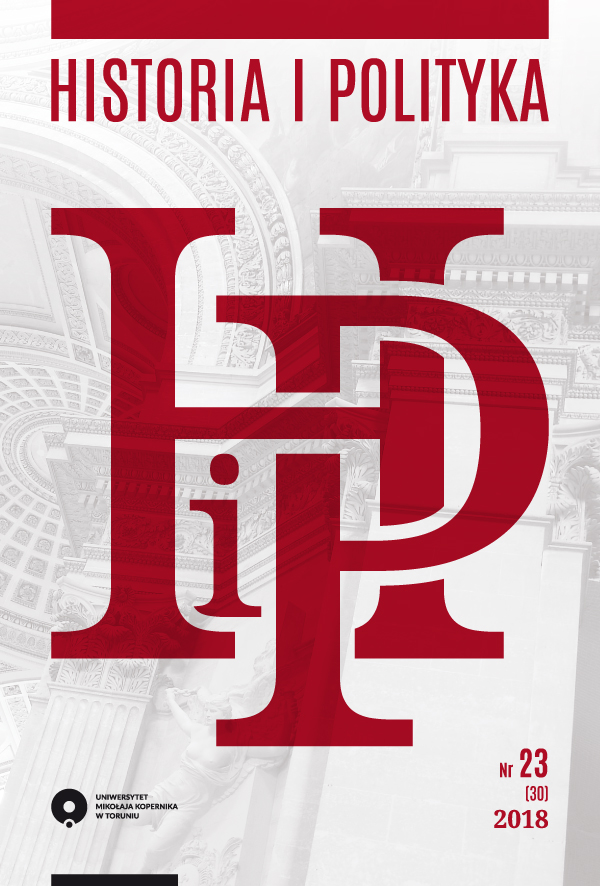Znaczenie sekurytyzacji i sektorów bezpieczeństwa w ramach krytycznych studiów nad bezpieczeństwem
DOI:
https://doi.org/10.12775/HiP.2018.003Słowa kluczowe
bezpieczeństwo, security studies, krytyczne studia nad bezpieczeństwem, sekurytyzacja, szkoła kopenhaska, sektory bezpieczeństwaAbstrakt
Since the 1980s, there has been a debate about the evolution of the notion of security and its dimensions. The Copenhagen School, and its key concepts such as securitization, and security sectors, closely keep up with this security discourse and criticize traditional paradigms that could not predict the collapse of the USSR and the end of the Cold War. Therefore, the subject of this paper is to present the importance of main assumptions of critical security studies using the example of the Copenhagen School and the intersubjective approach to security in its multidimensional aspect.Bibliografia
Baldwin, D.A. (1995). Security Studies and the End of the Cold War. World Politics, 48.
Booth, K. (2007). Theory of World Security. New York: Cambridge University Press.
Brodie, B. (1949). Strategy as a Science. World Politics, Volume 1, Issue 4.
Bueger, Ch. (2010). Security as Performation: Securitization, Piracy and the United Nations Security Council. Bi-annual conference of the Standing Group for International Relations of the ECPR, Stockholm, European University Institute and Institute for Development and Peace.
Buzan, B. (1991). People, States and Fear: An Agenda For International Security Studies in the Post-Cold War Era, 2. wyd. Hertfordshire: Harvester Wheatsheaf.
Buzan, B., Wæver, O., de Wilde, J. (1998). Security: A New Framework for Analysis. Boulder: Lynne Rienner Publishers.
Keohane, R., Nye, J. (1977). Power and Interdependence. World Politics in Transition. Boston: Little, Brown and Company.
Kostecki, W. (1996). Europe After the Cold War. The Security Complex Theory. Warszawa: Instytut Studiów Politycznych PAN.
Musioł, M. (2015). Kompleks Bezpieczeństwa w regionie Azji Środkowej po 1991 roku. Warszawa: Dom Wydawniczy ELIPSA.
Stadtmüller, E. (2002). Pokój i bezpieczeństwo we współczesnym świecie. W: Z. Cesarz, E. Stadtmüller (red.), Problemy polityczne współczesnego świata. Wrocław: Wydawnictwo Uniwersytetu Wrocławskiego.
Taylor, B. (2012). National Security College Occasional Paper, No 3 April.
Waltz, K. (1979). Theory of International Politics. New York: Random House.
Williams, P.D. (2008). Security Studies. An Introduction. London, New York: Routledge.
Vuori, J.A. (2011). How To Do Security With Words. A Grammar of Securitisation in the People’s Republic of China. Turku: Turun Yliopisto, University of Turku.
Pobrania
Opublikowane
Jak cytować
Numer
Dział
Licencja
Prawa autorskie (c) 2018 Historia i Polityka

Utwór dostępny jest na licencji Creative Commons Uznanie autorstwa – Bez utworów zależnych 4.0 Międzynarodowe.
Uniwersytet Mikołaja Kopernika w Toruniu respektuje prawo do prywatności i ochrony danych osobowych autorów.
Dane autorów nie są wykorzystywane w celach handlowych i marketingowych. Redaktorzy i recenzenci są zobowiązani do zachowania w poufności wszelkich informacji związanych ze złożonymi do redakcji tekstami.
Autor, zgłaszając swój tekst wyraża zgodę na wszystkie warunki i zapisy umowy licencyjnej (określającej prawa autorskie) z Uniwersytetem Mikołaja Kopernika w Toruniu.
Statystyki
Liczba wyświetleń i pobrań: 1210
Liczba cytowań: 0



